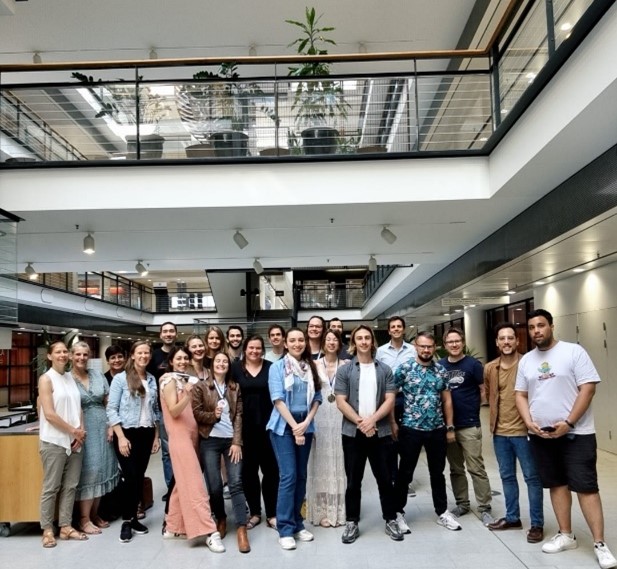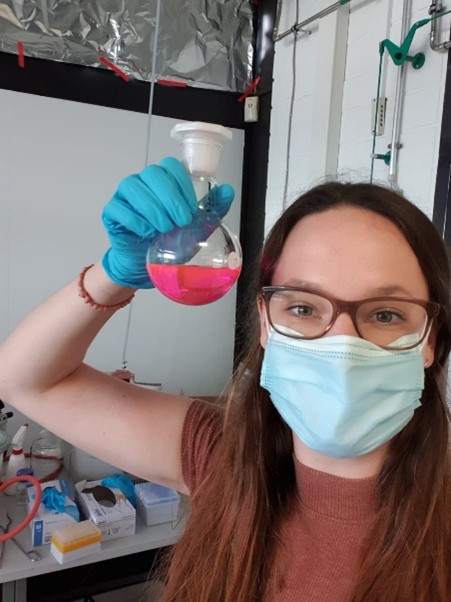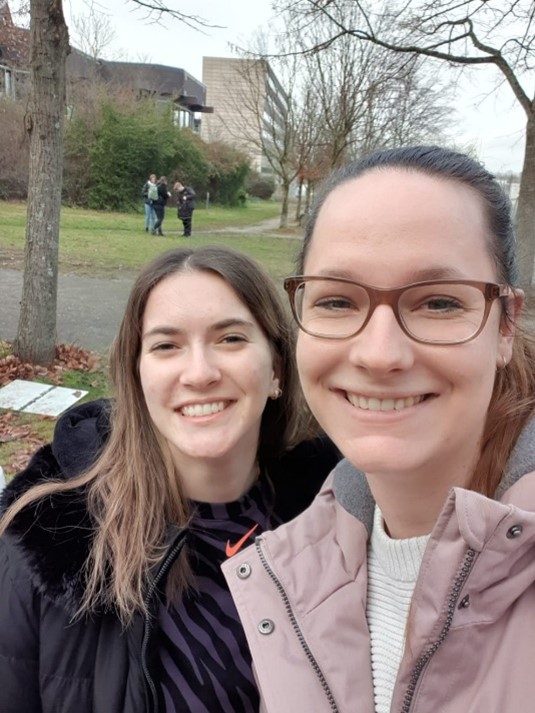Since the day I started my bachelor program, I wanted to obtain a doctoral degree and become an independent researcher. During my bachelor and master studies, I had done multiple internships in different universities, countries, and even in the industry. Therefore, I wanted to search for the Ph.D. position which suited me the best, not limiting the search to my home university or even country.
Normally, such a Ph.D. application means having an interview in person and getting to know your new working environment. For me, since this was during the pandemic, it all occurred online. I found my Ph.D. position faster than I expected. Luckily, my Professor invited me to meet the group before actually starting there so I knew the people and got to see the lab before starting there. I landed on a position in the frame of the European Training Network (ETN) Magicbullet::Reloaded and obtained a Marie Curie grant in Darmstadt, Germany, a mid-sized town close to Frankfurt am Main with a well-known Technical University.
A European Network
The Marie Curie grant is a European-Union-funded Ph.D. position that tries to stimulate the spreading of knowledge throughout Europe. This grant is set up so everyone who applies can only select positions outside of the country where they have lived for the last three years. This means that all the Ph.D. students have to move to a new country. Additionally, it contains a so-called “secondment”, which means a stay abroad in either industry or at a university where you will gain additional knowledge on your project.
The last—but in my opinion most important —part of the grant is the network that is created, consisting of the other Ph.D. students and their PIs. I found myself part of a network of 15 Ph.D. students with the same grant, working on a related topic, starting around the same time, and following a similar journey. Even though the Ph.D. positions were spread all over Europe, we had the same starting line for our Ph.D., which became more valuable than I ever expected.
 |
|
The amazing Magicbullet::Reloaded network during our last meeting in Helsinki. |
Moving Abroad during the Pandemic
Moving to a new country is always challenging, and doing so during a global pandemic made it even more difficult. For me, moving to a new country was not a new concept since I have lived abroad during my bachelor and my master studies. Hence, I was used to rebuilding my life in a new setting and making new friends. However, doing so at a time when most people are afraid to meet new people proved to be the biggest challenge yet. This made me feel out of place, even lonely sometimes. While I had a full life in my hometown, a whole support group of friends and family, I had to start here alone facing lockdown conditions. While my colleagues tried to help me a lot, they were all from the Darmstadt area and had their own lives outside of work. The advantage of working in a chemical lab was that, even during the lockdowns, I was allowed to work in the lab every other week. This at least gave me the chance to see my colleagues every other week and build some connections.
When the rules and restrictions started to ease up, we were able to meet the other Ph.D. students in our Marie Curie network. This was an almost liberating feeling. Although everyone had tried to be supportive and understanding—my friends, family, and colleagues—no one really understood what I was going through except the other Marie Curie Ph.D. students. The value of a network should never be underestimated. It was amazing to hear from others about rather similar struggles to the ones I was facing in the first eighteen months of my Ph.D. I felt validated, like I was not alone in these feelings.
Imposter Syndrome
About half a year before we could meet in person, I joined the scientific community on Instagram. This is what initially helped me to keep going. I loved seeing other chemistry Ph.D. students all around the world sharing their journeys. This is where I first became aware of imposter syndrome. This refers to the feeling that everyone “belongs” but you, you are out of place or an imposter. The feeling that they have chosen wrong in selecting you since there must be better people out there. The feeling that you are not good enough or smart enough for the job. It was, again, liberating to hear that others felt the same way as I did and I was not alone anymore.
Since I was a bachelor student I had been attending scientific conferences. However, I often felt out of place and had the personal feeling that I was not good enough or smart enough to be there and be a part of the scientific community at the same level of competence as others. When I started my Ph.D., it was a big step forward. During your studies, you are a student, you learn new things all the time, and you are aware of the fact that you do not know that much. Fair enough, since you are there to learn, but the change to a Ph.D. student position is huge. In a couple of months, you become a specialist in your research field. You have to organize your projects since you are now the expert. And not only that, you make a transition from being a student to becoming a teacher. You have to instruct other bachelor and masters students working for you and helping to bring your project forward.
I am not certain whether everyone will struggle in this transition, at least to the same extent, but I can for sure say that I did. This is where the imposter syndrome sets in. You start to question your decisions. I still remember being a bit afraid to go to the laboratory. I had been in the laboratory numerous times and knew what to do, but I started second-guessing everything. What if something went wrong? What if something happens and I am not overly prepared? What if the decision I made was stupid? What if I am not good enough and they chose the wrong person for the Ph.D. position?
I now realize that most of us struggle with these or similar questions, and this realization made it easier for me to come to terms with it. I became more confident, not just because I became more skilled in my projects, but because I trusted my Professor and myself. I trusted that I would have gotten feedback if I was as bad as I thought I was. I trusted my colleagues and started an open dialog about my doubts. In addition, what helped me a lot was starting the science communication account on Instagram. This is a community built by other Ph.D. students all over the world.
 |
|
The first final construct I made that I could test in a biological assay. |
Finding a Community Online
I had heard of the Twitter community before, but Twitter was not really for me. This had to do with the fact that it limits what you can share and most of the time people need a lot of tweets to get their point across. Now, Instagram is a whole different ball game. It started out with pictures and was transformed to also include guides and videos. The guides are often used to share tips and tricks on topics like the supervision of students, going to conferences, online teaching, and so much more. The videos (called reels) are used for funny struggles or informational instruction videos about specific machines or compounds. It depicted the life of other Ph.D. students—not just the highlights, but all of it.
Now, one of the most important lessons I learned on the science communication side was the importance of the word “social” in social media. You have to start building a community of people that mutually benefit from that connection. For me, this community started with other Ph.D. students—not just chemistry-related Ph.D. students. Within this community, I found I could interact with people who were facing similar problems and frustrations. I noticed similarities between all of us, and the research field did not seem that relevant. For example, the stress before giving a presentation or the search for ways to plan everything so you do not get overwhelmed affected Ph.D. students in different fields. It made me realize that the Ph.D. comes with struggles that most of us have to deal with, it was not just me.
When I was a bachelor or even a master student, my Ph.D.-level supervisors always tried to be perfect. They never shared their issues with their projects, they hid them away, and so I kept looking up to them. Being a Ph.D. student myself, I now understand the importance of sharing these issues with your students. We are all human and we all make mistakes, have trouble with a project and struggle sometimes. However, I had never seen it in the context of a Ph.D. student until I joined this Instagram community. There, Ph.D. students openly shared their troubles, and others provide solutions based on their own experiences.
 |
|
The first student I supervised, Sofija, and myself. |
Growing as a Scientist and as a Person
So, I started my journey within the science communication world. Sharing the troubles I had, the tips and tricks I learned, and my experience as a Ph.D. student. This online community helped me in growing as a scientist and as a person. The imposter syndrome that I had struggled with in the beginning started to subside. It made me feel like I deserve to be here, and I became a valuable member of the research group I am affiliated with. The funny part is, the more I mention it, the more people say they feel or felt the same. It is not just the Ph.D. students who struggle: I have met newly appointed Professors who said they felt like an imposter. Which makes sense to me now: In a new position, we will most likely wonder if it is a mutual fit. So why did I feel like it was just me?
If there are some recommendations I could leave you with today, it would be the importance of a community in your private life and research environment—not just your friends and family, but the colleagues, students you will supervise, and the people in the scientific community you will meet along the way. Now, this does not mean you have to add everyone you meet along the way to your community, you deserve to select the people you want. However, if we all start to normalize the struggles we have and share them openly, we can grow together. People cannot help you if they do not know what you struggle with. Nobody is perfect—not even your supervisors—but if we do not share the mistakes we make, how can we expect our students to do so? If you are in meetings or at conferences, ask the questions you have, even if you feel they are silly. I have learned that if you ask a question you are probably not the only one in the room wondering about it, and everyone in the audience will learn from the answer.
In a nutshell: I know a Ph.D. experience is different for everyone and we all struggle with the ups and downs on the journey. I know starting a Ph.D. during a pandemic will always make my experience somewhat unique. Still, I hope my story can help present and future Ph.D. students following in my footsteps.
Ph.D. Journeys Abroad – And so the Adventure Has Begun …
Stories about obtaining a Ph.D. in a foreign country, facing challenges, and experiencing positive changes
Ph.D. Journeys Abroad – Be Kind to Yourself
A look at problems during a Ph.D. abroad and the importance of realistic expectations
Ph.D. Journeys Abroad – Creating a Second Home
Experiences with overcoming loneliness during a Ph.D. abroad and finding one’s community
Ph.D. Journeys Abroad – The Challenges of Starting a New Life Far from Home
How finding one’s strength and accepting help can help to overcome the pressures, doubts, and stresses a Ph.D. abroad brings with it (will be published in February 2023)





A great piece to read! Thank you Lieke for sharing your story in details! I know we talked about it briefly and then you initiated the IYCN survey in this regards:) waiting for the results to come up soon and continue working on this project. It’s valuable to tackle these topics and let other fellows feel that they are not alone. Thank you